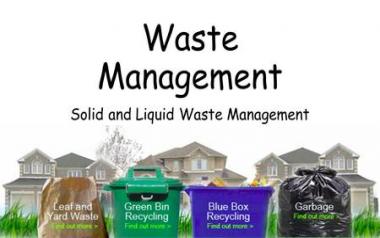Solid and Liquid Waste Management (SLWM) in Rural Areas
Water, sanitation, and hygiene (WASH) directly impact human health and have far reaching consequences when ignored. India is one of the fastest developing economies, but when it comes to WASH indicators, it continues to lag behind. With a population of over 1.2 billion, there is a mounting and urgent need to address sanitation.
Solid and Liquid Waste Management (SLWM) is one of the key components of Swachh Bharat Mission-Gramin (SBM-G), launched with the objective of bringing improvement in cleanliness, hygiene and the general quality of life in rural areas.
Solid Waste
In rural areas, examples of solid waste include wastes from kitchens, gardens, cattle sheds, agriculture, and materials such as metal, paper, plastic, cloth, and so on. They are organic and inorganic materials with no remaining economic value to the owner produced by homes, commercial and industrial establishments.
Most household waste in rural areas is organic, with little inorganic material, and is non-toxic. Because of its environment-friendliness, composting is a highly suitable method of waste management in rural areas.
Liquid Waste
When water is used once and is no longer fit for human consumption or any other use, it is considered to be liquid waste. Wastewater can be subcategorised as industrial and domestic:
SLWM under SBM Guidelines
SBM focuses on generating awareness and providing community managed sanitation systems. To implement SLWM initiatives economically and efficiently, ownership at grass root level and community involvement at all stages is critical.
Information, Education, and Communication (IEC) interventions should focus on SLWM to create a demand for a sustainable system. This must lead to setting up systems for waste disposal in such a way that it has tangible impact on the population. The community/Gram Panchayat (GP) has to be encouraged to come forward and demand such a system, which they can subsequently operate and maintain.
Awareness and education campaigns should aim for panchayat officials, elected representatives, schools, non governmental organisations (NGOs) working in villages, shop keepers, families, and general public.
The GP functionaries would be responsible for design, implementation, operation and maintenance (O&M) of SLWM systems with support from respective state governments. Mechanisms for involving third parties in construction and management activities under GP and community supervision can be explored. In such cases, absolute clarity in the roles and responsibilities of various stakeholders in managing SLWM systems is a must. Community contribution and appropriate user charges for sustainable SLWM initiatives are also desirable.
| Title | Size | Detail |
|---|---|---|
| Solid & Liquid Waste Management Project Document | 1.05 MB |
